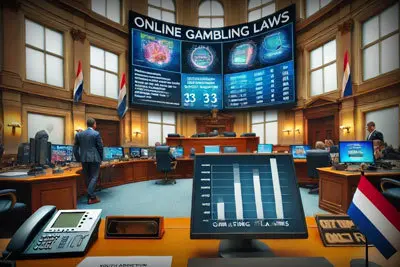
KSA’s Warnings on Sponsorship Violations
The KSA’s recent warnings highlighted instances where operators disregarded restrictions on sports sponsorship visibility, affecting both promotional materials and branded merchandise. Although the KSA did not disclose the names of the operators, it outlined each case to clarify the violations. One operator had expired sponsorship materials displayed at a national event, which were removed immediately after the KSA’s warning. Another was flagged for displaying branding in areas frequented by young audiences, thus inadvertently promoting gambling to minors. The third operator’s branding was visible on children’s apparel in an online sports shop, a clear violation of the rules.
The crackdown on these sponsorship breaches comes as part of a broader effort to enforce the Netherlands’ 2023 ban on “untargeted” gambling advertising, which prohibits such ads on television, radio, and in public spaces. Although sports sponsorship remains a permissible advertising avenue, it is tightly regulated, and the KSA has clarified that these sponsorships must avoid targeting or influencing young or vulnerable audiences.
Urgent Reform and Criticisms of Current Legislation
While the KSA has been taking steps to ensure compliance, a recent report by the Dutch government’s research agency, WODC, suggests that the current legislation may not sufficiently protect Dutch players from the risks associated with gambling. The report reveals an increase in gambling addiction rates, especially among young adults, since the introduction of legal online gambling in 2021. According to WODC, the licensing of gambling operators, originally intended to provide safer and regulated options for gamblers, has not met expectations. Instead, the agency finds that young players, a group particularly vulnerable to gambling-related harm, are now facing increased risks.
The WODC report further indicates that many licensed operators have failed to adequately support individuals seeking help for gambling issues. In a test by researchers posing as gamblers, only six out of 23 licensed companies offered assistance, while others redirected them to promotional pages rather than support resources. The report underscores a critical shortfall in duty-of-care measures and questions whether gambling companies, driven by profit motives, can adequately safeguard player welfare.
Recommendations for Enhanced Regulatory Oversight
In light of these findings, the WODC recommends urgent amendments to the current gambling regulations. Key suggestions include centralizing duty-of-care policies rather than allowing operators to self-regulate, improving data access for independent research on addiction prevention, and expanding the KSA’s powers to combat illegal gambling. The report also urges a shift in the core objective of the Remote Gambling Act (Koa) from merely “preventing addiction” to preventing all forms of “gambling harm,” acknowledging that gambling can lead to financial, social, and psychological issues beyond addiction.
Furthermore, the report highlights that illegal online gambling, primarily operated from abroad, poses a significant challenge to the KSA due to jurisdictional limitations. Strengthening enforcement against unauthorized sites, in addition to regulating licensed operators, could create a safer gambling environment in the Netherlands.
The KSA has reinforced its commitment to regulating licensed operators while supporting the call for stricter policies. It reminded operators to establish firm agreements with external parties to ensure all sponsorship materials comply with advertising restrictions, particularly with an outright ban on all sports sponsorship set to take effect in July 2025.
Source:
“Online Gambling Laws Are Boosting Addiction Among the Young“, dutchnews.nl, November 5, 2024.




